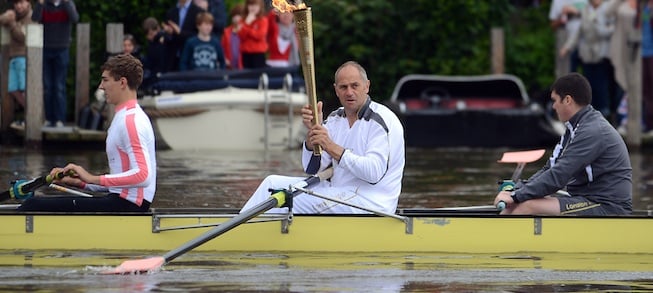Sir Steve Redgrave and Mike Spracklen: A river runs through them
Lads from Marlow connected by Olympic dreams and past glories
HENLEY ON THAMES, UNITED KINGDOM – JULY 10: In this handout image provided by LOCOG, Former Olympic gold medalist rower and Torchbearer Sir Steve Redgrave (C) carries the Olympic Flame on a boat on the River Thames on the Torch Relay leg between Wallingford and Henley on Thames during day 53 of the London 2012 Olympic Torch Relay leg from Oxford to Reading on July 9, 2012 in Henley on Thames, England. The Olympic Flame is now on day 53 of a 70-day relay involving 8,000 torchbearers covering 8,000 miles. (Photo by LOCOG via Getty Images)
Share
 Together, Sir Steve Redgrave and his one-time coach, Canada’s Mike Spracklen, have forgotten more about rowing than most Olympians learn in a lifetime.
Together, Sir Steve Redgrave and his one-time coach, Canada’s Mike Spracklen, have forgotten more about rowing than most Olympians learn in a lifetime.
They’re two lads from Marlow, a scenic city on the Thames River in Buckinghamshire England, born a generation apart. They laid the foundation of their reputations during countless hours on the great river that flows past their town.
Steve Redgrave, 50, who ran the torch into the Olympic Stadium Friday during the opening ceremony for London 2012 Summer Games, is considered Britain’s greatest Olympian. He earned fame and a knighthood after winning rowing golds at five consecutive Olympic Games between from 1984 to 2000, as well as a bronze medal at the 1988 Summer Games.
Less known, at least outside the rowing world, is 74-year-old Spracklen, the coach of the Canadian men’s eight boat racing at the Eton Dorney course these Games. Spracklen was a tenacious rower himself who never competed in Olympics as an athlete. There was no category then for his class of lightweight rower.
But it was as a coach, initially as an unpaid amateur in Britain, that he made his mark. He guided the hulking 6-foot-five Redgrave, to his first two Olympic gold medals, before moving to Canada as a professional coach in the early 1990s. He was also a key part of the coaching team that brought glory to Oxford University in its famed annual boat races with rival Cambridge.
Spracklen is a firm believer in high volume training, a brutal workload that has made him more than a few enemies among his charges. But his uncompromising methods have delivered a boatload of World Cup and Olympic medals for Canada, Britain and the U.S.—most recently gold in the Canadian men’s eight in Beijing.
For Redgrave, this home country event represents a victory lap.
In addition to being the last Olympian to touch the flame before handing it off to seven young athletes to light the cauldron, Redgrave has taken on something of a larger coaching role—writing a survival guide for Olympians in the Athletes’ Village. Included in his sage advice:
- Don’t be tempted by the vast array of food in the village. In Barcelona, he admitted he and his fellow rowers wolfed down an average of eight Magnum ice cream bars per day. Not a good idea.
- Don’t lose your edge by over-indulging in the many distractions the village has to offer. “You need the pressure of competition with you at all times.” He admitted to playing so many free video games at the Los Angeles Olympics “that I developed a wrist condition called tenosynovitis.”
- Lay off Twitter and email in the period before competition—advice that very few athletes seem to be taking. Indeed, the International Olympic Committee is encouraging their use of social media as never before. Not only is it a distraction, in Redgrave’s view, it has too often led in his experience to trash talking among rivals.
- As for trash talk, it wasn’t his style to wind up his rivals, “it would only rile them to try even harder.”
If Redgrave and Spracklen get a chance to reminisce over past glories, it may have to wait until after the rowing competitions conclude. Canada’s rowers are ensconced in a hotel near the Eton rowing course—far from the temptations of the athletes’ village.